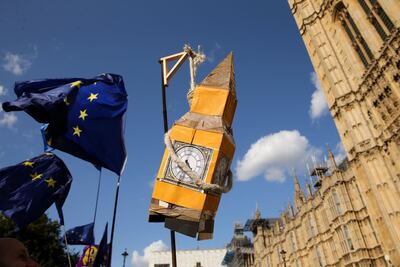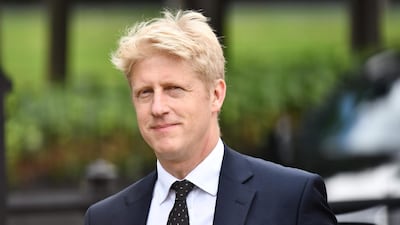Boris Johnson's brother has announced his resignation as an MP and as a minister, in another blow for the embattled UK Prime Minister.
Meanwhile, the British government confirmed it would on Monday give MPs another chance to vote for an early general election.
Jo Johnson, who quit Theresa May's administration in protest over her handling of the Brexit process, made the shock announcement on Twitter.
"In recent weeks I have been torn between family loyalty and the national interest," he said. "It's an unresolvable tension."
Mr Johnson, who rejoined the government as a business minister when his brother became prime minister, supported the Remain side in the 2016 EU referendum.
But he did not join a group of 21 Conservative MPs who voted against the government by supporting a bill to stop Britain leaving the EU without a deal.
The rebel MPs were then removed from the party by the prime minister in a move that was heavily criticised.
Their bill is now set to be passed through Parliament’s upper chamber on Friday, the government announced on Thursday.
The proposed legislation would request an extension to the current Brexit deadline of October 31.
Supporters feared it could be held up in the Lords by by pro-Brexit peers so it could not be formally approved before Parliament is suspended next week.
But the ruling Conservative government reached a deal with the opposition Labour Party agreeing to return the bill to the Commons on Monday, where other amendments could be added before it is passed into law.
Analysts called the concession given by Boris Johnson a tactical retreat that gave the the government grounds to call a snap poll.
The leader of the Commons, Jacob Rees-Mogg, confirmed on Thursday the government would table another motion to hold a general election, after its first attempt was defeated on Wednesday.
Mr Johnson has now lost all three of the key votes in Parliament since he became leader.
But on Thursday he reiterated his determination to deliver Brexit saying he'd “rather be dead in a ditch” than agree to another delay.

Labour leader Jeremy Corbyn, who has been calling for an early election for months, told his MPs to abstain from the vote, saying he would not support it until the no-deal bill became law.
Opposition MPs feared that supporting an election call before the bill was passed could allow Mr Johnson to take Britain out of the EU without a deal on October 31.
"Let the bill pass and have royal assent and then we can have a general election," Mr Corbyn said.
The UK has five-year, fixed-term parliaments, although an early election can be called if it wins the support of two thirds of the 650 MPs in the Commons.
Only 298 MPs supported the election poll, with 56 voting against and 288 abstaining.
Mr Johnson called Mr Corbyn’s refusal to back an early election a “cowardly insult to democracy”.
"It is clear the only action is to go back to the people and give them the opportunity to decide what they want: Boris to go to Brussels and get a deal, or leave without one on October 31, or Jeremy Corbyn arriving in Brussels with his surrender bill begging for more delay, more dither and accepting whatever terms Brussels imposes over our nation,” Mr Johnson's spokesman said.
The prime minister said on Wednesday that talks with the EU on a new divorce deal were “making substantial progress”, but Brussels denied any advance.
European Commission spokeswoman Mina Andreeva said the bloc had seen “nothing new” from the UK.
Later on Wednesday, in a break from the Brexit impasse, Mr Johnson went to Yorkshire to announce a recruitment drive for 20,000 police officers.
But despite hoping for a day of welcome for the news, more protesters awaited his arrival.


